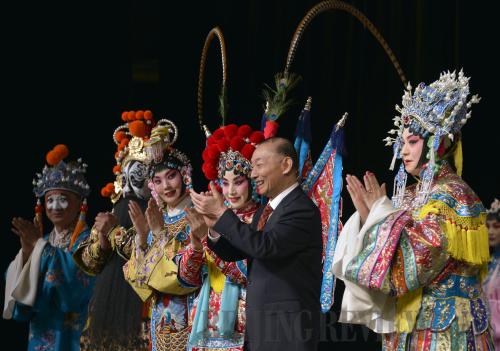|
 |
|
CARRYING ON A TRADITION: Mei Baojiu (second right), eminent Peking Opera performer and son of Mei Lanfang, greets the audience after a performance at the John F. Kennedy Center for the Performing Arts on August 27 in Washington, D.C. (YIN BOGU) |
'If we want to protect real world peace, humanity must mutually understand, mutually tolerate and sympathize, mutually assist and not battle."
Eighty-four years ago, Chinese folk hero and Peking Opera master Mei Lanfang spoke these words to the graduating class of the University of Southern California, calling for peace amid an epic six-month tour of the United States aimed at building cultural understanding. The performances of classic Peking Opera or Jingju—which inspired J. Brooks Atkitson of The New York Times to lavish praise on Mei Lanfang's "exquisite loveliness in pantomime and costume"—were hailed by international media as diplomatic triumphs and the sign of a new phase in Chinese-American relations.
Much has changed since Mei Lanfang electrified New York audiences with his stories of female warriors, tragic romances and royal intrigue, all of which rivaled Shakespeare's greatest works. The master started a school—the Mei School—and took his place among the pantheon of internationally recognized artistic legends. Since then, the relationship between China and the United States has grown tremendously in ways that could not have been imagined 84 years ago.
Celebrating the 120th anniversary of Mei Lanfang's birth, the Jingju Theater Co. of Beijing brought a selection of the master's greatest works to New York's Lincoln Center and the Kennedy Center in Washington, D.C., throughout late August. The performances were a nostalgic, yet somehow timely, reminder of the noble power of the fine arts.
Just as before, the works of Mei Lanfang electrified audiences in New York. From the moment the lovely performer Dou Xiaoxuan stepped on stage as the goddess Apsara, scattering flower petals on the wind, the audience at the David H. Koch Theater sat enraptured. Dou deftly whirled and flung the long silk sleeves of her traditional gown about the stage, seemingly delicate yet powerful. The high pitch of traditional Peking Opera, still unfamiliar to many Westerners, was a novelty, and subtitles translated the lyrics for English speakers. Acrobats tumbled around a dancing clam in Pierce the Mussel and Shang Wei, the lead performer in the stage production of Farewell My Concubine, was praised by The New York Times as "captivating" and the "picture of stoic, stylized beauty."
"I have never seen anything like this before," said Diane Webster, a New York theater patron who had been invited to the performance by her daughter. "I love the costumes and the tumbling. It's fun. I wouldn't say I understand everything that is going on—but I like it."
More than 80 performers, including an orchestra of traditional Chinese musical instrumentalists, were on the tour, and much emphasis was placed on providing Western audiences with explanations of the costumes, make-up styles, storylines and traditional music. Artifacts from Mei Lanfang's 1930 tour were displayed during the intermission, and members of the audience excitedly took pictures with the displays.
"I learned a lot about Peking Opera, especially the costumes. I like that they explained it," said James Patterson, visiting from Boston. "I liked learning the history of Mei Lanfang, who obviously still has so much influence today."
|
